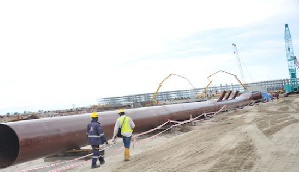The Dangote Group, which is currently building one of the world’s largest refinery, is promising to supply natural gas to Ghana to make up for the country’s deficit that occasionally triggers electricity generation shortfall.
Ghana will receive over 20 percent of natural gas from the petrochemical plant that is under construction in Nigeria to fire its power generating plants, officials told journalists during a tour of the facility in Lekki, Lagos State.
The development will be a welcoming one for Ghana’s energy sector, which has for the past four years witnessed some challenges in electricity generation resulting in crisis that have impacted negatively on the country’s economy.
Ghana has over the years experienced shortfall in natural gas supply from Nigeria Gas [NGas] through the West African Gas Pipeline to power electricity generating plants, particularly those in the Tema enclave, which rely solely on natural gas.
The issue of Ghana’s indebtedness to Nigeria recently compounded the problem as the suppliers were forced to close their pipelines to Ghana until a government intervention.
The 12-billion-dollar Dangote project is set to generate enough natural gas, which officials say Ghana will be one of the key countries they will export the gas.
The plant, which will be ready in 2019, would refine 650,000 barrels of crude oil per day, and produce 400 megawatts of power, as well as produce some other petrochemical products to serve the African continent. Officials are hopeful the completion of the world-class refinery will end the recurring power and fuel crisis in some countries in the sub-region.
Head of Engineering, Rama Rao Putta told TV3 the second phase of the petrochemical manufacturing plant would integrate into the refinery.
He noted that the designing, engineering, and procurement are nearing completion, adding 95 per cent of the project materials have arrived on site for construction to take place on 250,000 hectares of land. Media Relations Manager of Dangote Group-Ghana, Etornam Komla Buami said the project would generate 1,600 permanent jobs and 100,000 indirect jobs.
Business News of Friday, 14 October 2016
Source: 3news.com

















